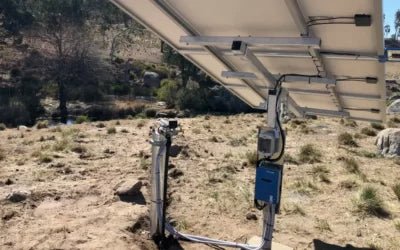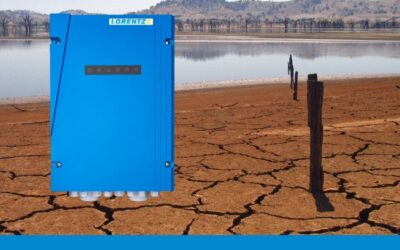With Australia’s unpredictable climate and frequent water scarcity, reliable and efficient water solutions are salient. In the pursuit of effective water management, many Australian farmers are turning to submersible water pumps, a sophisticated technology revolutionising how agriculturalists operate.
In this article, we dive into the unparalleled efficiency of submersible pumps and guide you in choosing the right equipment to aid your agricultural endeavours.
What is a Submersible Pump?
A submersible pump is a pump that can be fully submerged in water. The motor is protected from the water and allows the change of water under high and low temperature conditions. Additionally, the motor is close-coupled to the body of the pump.
Submersible pumps are one of the most efficient pumping options available if you need to pump liquid from a large body of water.
When to use a Submersible Pump vs Surface Pump
Customers frequently seek advice on when to use surface pumps and when to opt for submersible pumps. The following points elucidate the disparities between the two types and aid in selecting the ideal pump for your customer.
When to use Submersible Pumps
Submersible motors excel in cooling compared to surface-operated motors. Water cooling around the submersible motor leads to lower temperatures, resulting in higher motor efficiency and a reduced solar module array size for the same output. Submersible motors also exhibit smaller temperature fluctuations due to constant water temperature, maximising the lifespan of electrical and electronic components.
Submersible pumps do not require suction to draw water into the pump since they are submerged. This attribute boosts their efficiency, as the suction efficiency of a pump cannot match that of a submersible pump that pressurises water.

When to use Surface Pumps
Surface pumps typically have more operating space compared to boreholes, necessitating larger diameter motor designs for the same power rating. This larger diameter contributes to significantly higher motor efficiency for AC motors compared to equivalently rated submersible motors. An efficient surface motor runs cooler and can be effectively air-cooled.
Surface pumps must draw water through long pipelines and lift it 3.0 m – 4.0 m high. In warm climates, this can cause cavitation inside the pump suction side, leading to high noise levels and potential pump damage.
Due to limited suction ability in surface pumps, there is no tolerance for water level drops in the dry season. This can result in even more cavitation.
Our Recommendation
LORENTZ strongly advocates for the use of Submersible Pumps in warm and remote regions where fluctuating water levels are common and suction lift cannot be controlled within surface pump limits. While LORENTZ offers both submersible and surface pumps of our own design, our expertise and experience have resulted in over 90% of sales favouring submersible pumps for the reasons mentioned above.
When to use a submersible water pump
When your water source is a large body of water like a bore or dam
To provide drinking water for livestock or irrigation for farms
How Submersible Pumps are powered
Solar Power
Submersible solar pumps are both energy-efficient and eco-friendly as they mobilise renewable energy from the sun. These pumps use photovoltaic (PV) panels that absorb sunlight, transforming it into electricity. The electricity powers the submersible pump’s motor. This energy source is also highly cost-effective and suited to remote farms with limited electrical supplies.
LORENTZ offers a variety of cutting-edge submersible solar pump technologies, including PS2 Solar Pump Systems Centrifugal and Helical Rotor pump systems, designed to sustainably optimise water management.
Hybrid (Diesel + Solar)
Hybrid submersible pumps combine grid or another electricity source with solar power, offering reliable and efficient energy that also helps save money.
This intelligent integration offers a practical solution for farms that experience varying weather and fluctuating energy availability. It promotes an uninterrupted water supply while embracing sustainable practices.
Check out LORENTZ’s hybrid solar pump technology, which seamlessly blends grid electricity with solar power. This smart solution will adequately power your water distribution system.
Diesel or Petrol
Diesel or petrol submersible pumps are powered by diesel engines. This method is often used in remote areas where access to electricity is scarce or unpredictable. While these pumps boast a high output of energy, they release large volumes of CO2 and present significant costs, making them a less preferred option for agriculturalists.
Electric
Electric submersible pumps are among the most common pump types. These pumps either depend on grid electricity or on-site generators. Farmers often favour their simplicity. Electric pumps are available in various capacities, catering to different farm sizes. Electric pumps are cheaper to run than diesel pumps, but hybrid and solar power pumps can present significantly lower running costs than electric pumps.
Speak to a LORENTZ Dealer to size your Submersible Pump
6 Advantages of Submersible Water Pumps
Superior Efficiency
Because of their advanced motorised technology, submersible water pumps are notably efficient. Their unique design minimises the need for suction or priming, equalling minimal water and energy loss during pumping periods.
Compared to traditional pump methods, the efficiency of submersible pumps also translates into reduced operational costs, especially if you integrate solar or hybrid power into your system.
Effective & Consistent Water Management
Submersible pumps distribute water in a controlled, automated manner, ensuring effective and consistent water management. This means little to no manual labour is needed to operate submersible pumps, freeing up your capacity to focus on other agricultural tasks.
Environmentally Friendly
While this benefit doesn’t apply to diesel pumps, embracing solar or hybrid submersible pumps boasts many environmental benefits. Advantages include reduced greenhouse gas emissions, and a drastically minimised carbon footprint, ensuring you don’t make any significant negative contributions to global warming.
Versatility
Submersible pumps come in many forms, shapes and sizes, catering to various agricultural needs and activities. Whether it be small-scale irrigation or large-scale drainage applications, you can choose from several specialised submersible pumps with varying capacities, ensuring your farming needs are adequately met.
Quiet Operation
Because submersible pumps function underwater, they operate extremely peacefully, especially when compared to above-ground pumps! Quietness is particularly beneficial if your farm is near your home or in a residential area. It’s also ideal if you keep any noise-sensitive animals on your farm, such as horses, ensuring they can enjoy a peaceful and stress-free environment.
Space-Saving Design
Underwater pumps don’t require any extensive above-ground infrastructure. You can save valuable land for additional farming practices, such as growing more crops or maintaining livestock.
Choosing the right Submersible Pump
Irrigators and Station Owners often use submersible pumps to pump water from groundwater sources (such as boreholes, dams and lakes).
When selecting any pump for an application, regardless of the power source several points need to first be established. This includes:
- Pumping duration.
- Standing Water Level.
- Pumping Water Level (usually pump setting unless known).
- Pump setting in the water source.
- Friction loss in all pipe & fittings.
- Total Dynamic Head (including friction).
Once these parameters have been established, we can then work towards selecting a suitable pump.

Finally, seek a reputable brand such as LORENTZ to minimise repairs while ensuring the solar pumps last the distance. We have seen so many agricultural businesses that have chosen much cheaper alternatives and they get 1-2 years out of the pumps plus repairs.
Many of our Customers have said that LORENTZ has pumped water around the clock for a decade with minimal repairs.
To find out more about LORENTZ speak to an accredited LORENTZ dealer here.











